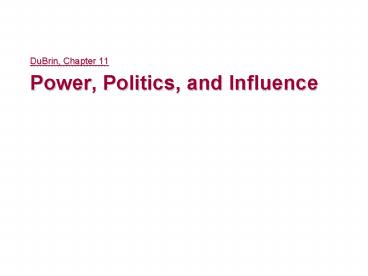DuBrin, Chapter 11 Power, Politics, and Influence - PowerPoint PPT Presentation
1 / 15
Title:
DuBrin, Chapter 11 Power, Politics, and Influence
Description:
Is the informal approaches to gaining power through means other ... Verbal persuasion. Emotional arousal. Strengthening of effort. performance. expectancy or ... – PowerPoint PPT presentation
Number of Views:557
Avg rating:3.0/5.0
Title: DuBrin, Chapter 11 Power, Politics, and Influence
1
DuBrin, Chapter 11Power, Politics, and Influence
2
Power, Politics, and Influence
- Power
- Is the potential or ability to influence
decisions and control resources. - Organizational politics
- Is the informal approaches to gaining power
through means other than merit or luck. - Influence
- Resembles power, but tends to be more subtle and
indirect.
3
Types of Power and Motives
- Socialized Power
- Is the use of power to achieve constructive ends.
- Personalized Power
- Is the use of power primarily for the sake of
personal aggrandizement and gain.
4
Sources of Power
- (Position Power) Power Granted by the
Organization - (Personal Power) Stemming from the Individual
- (Resource Power) Power from Providing Resources
5
Sources of Power (1 of 3)
- Power Granted by the Organization (Position
Power) - Legitimate power is based on the managers formal
position within the hierarchy of the firm. - Power is enhanced by establishing polices and
procedures that increase the scope of the
positions control. - Coercive power is controlling others through the
fear of punishment. - To be effective, employees must fear the
punishment. - Reward power is controlling others through
rewards or the promise of rewards. - Information Power formal control over
information that people need to do their work.
6
Sources of Power (2 of 3)
- Power Stemming from the Individual(Personal
Power) - Expert power is the ability to influence others
because of ones specialized knowledge, skills,
or abilities. - Referent power is the ability to influence others
that stems from ones desirable traits and
characteristics. - Prestige Power influence through status and
reputation.
7
Sources of Power (1 of 3)
- Power from Providing Resources
- Resource Dependence Perspective
- Subunits or individuals within an organization
who control or provide the resources that the
organization needs on a continuing basis can
become quite powerful. - Control of resources equals power for managers.
8
Empowerment of Group Members
- Empowerment
- Process of sharing power with group members,
thereby enhancing their feelings of
self-efficacy. - Strategic benefits of distributing power
- Improved productivity, quality, and satisfaction
- Keys for the transition to effective empowerment
- Sharing information
- Providing more structure (training and support)
- Gradually replacing traditional organizational
structure - Allowing individuals and teams to determine how
to achieve objectives - Above all, trusting in employees to do the right
thing
9
5 Stages in the Process of Empowerment
Stage 1 Conditions leading to a psychological
state of powerlessness
Stage 2 The use of managerial strategies and
techniques
Stage 3 To provide self-efficacy information to
subordinates, using four resources
Stage 4 Results in empowering experience of
subordinate
Stage 5 Leading to behavioral effects
Organizational factors Supervision Reward
system Nature of job
Participative management Goal setting Feedback
system Modeling Contingent/ competence- based
reward Job enrichment
Enactive attainment Vicarious experience Verbal
persuasion Emotional arousal
Strengthening of effort performance expectancy
or belief in personal efficacy
Initiation/ persistence of behavior to
accomplish task objectives
and
Remove conditions listed under Stage 1
Source Jay A. Conger and Rabindra N. Kanungo,
The Empowerment Process Integrating Theory and
Practice, Academy of Management Review (July
1988) p.475.
10
Signs of Empowerment / Disempowerment
- Empowered Employees
- Take initiative in ambiguous situations
- Identify opportunities in ambiguous situations
- Apply critical thinking skills
- Offer judgments about how decisions support
shared purpose - Identify and act on opportunities to improve
systems - Optimize resources by reducing expenses and
finding opportunities to invest in new resources
11
Signs of Empowerment / Disempowerment
- Disempowered Employees
- Wait for a designated authority to take charge
- Address problem but fail to see opportunity
- Accept decisions without questioning
- Discuss but not able to apply information about
shared purpose - Attempt consensus but yield to higher authority
when failing at consensus - Focus on resource questions only when directed to
do so
12
Factors Contributing To and Examples of Political
Behavior
- Organizations have a political nature due to
- Coalitions of interests competing for resources.
- A pyramidal power structure that concentrates
power at the top of the organization. - Downsizing and team structures limit upward
mobility for ambitious managers with a strong
need for power. - Decentralization disperses power in the
organization. - Machiavellian manipulation of others and the
organization for personal gain by some managers.
13
Effective Use of Politics
- Ethical Behaviors
- Develop power contacts
- Manage your impression
- Control vital information
- Keep informed
- Be courteous, pleasant, and positive
- Ask satisfied customer to contact your manager
- Avoid political blunders
- Use flattery sincerely
- Unethical Behaviors
- Engage in backstabbing
- Embrace-or-demolish
- Set a person up for failure
- Play territorial games (turf wars)
14
Organizational Influence Tactics
- Leading by example
- Assertiveness
- Rationality
- Ingratiation
- Exchange
- Inspirational appeal and emotional display
- Joking and kidding
15
The Control of Dysfunctional Politics and Ethical
Considerations
- Excessive politics and influence tactics can harm
an organization and its members. - Ways to control these activities
- Rely on objective measures of performance tied to
proper and significant goals for the
organization. - Align individual goals and objectives to be
congruent with those of the organization to
increase commitment and performance. - Practice open communications to remove the
political value of information and to increase
the overall understanding of the organization.































